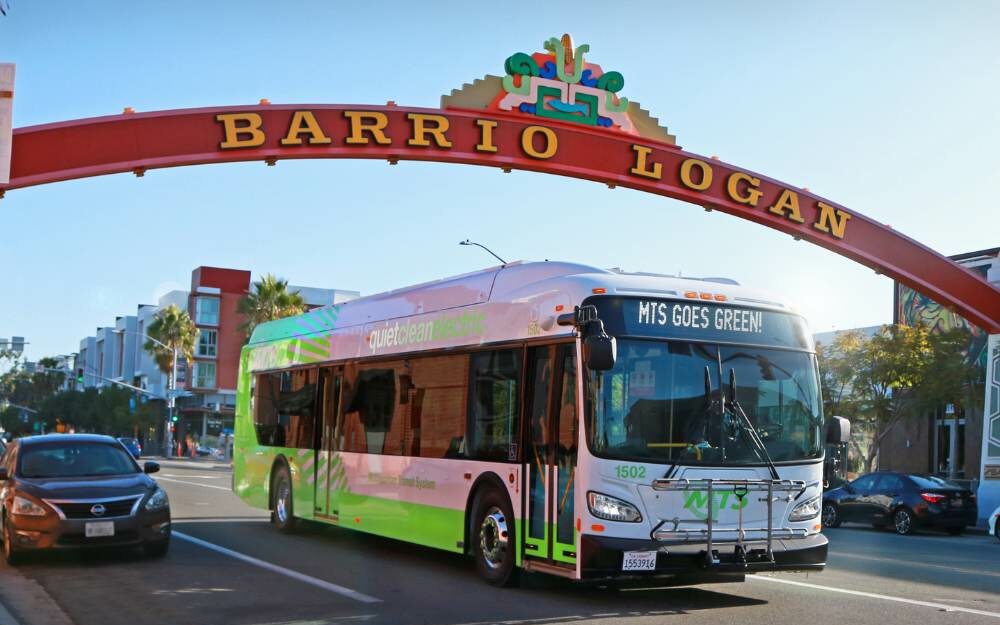FOR IMMEDIATE RELEASE
CONTACT
Angelica Estrada
angelicae@staging.environmentalhealth.org
562-708-3093
Lorena Nava Ruggero
lruggero@sdfoundation.org
619-814-1365
UNPRECEDENTED COALITION SEEKS $44 MILLION IN FUNDING FOR SAN DIEGO’S ENVIRONMENTAL JUSTICE COMMUNITIES
Community, philanthropic, and government coalition calls on community members to help bring millions of state grant funding and matching funds to some of City of San Diego’s most polluted, climate-vulnerable and culturally rich communities – the Historic Barrios.
SAN DIEGO, CA, APRIL 17, 2023 – On Saturday, April 15, 2023, Mayor Todd Gloria, Councilmember Vivian Moreno, and a more than a dozen stakeholder coalition hosted a press conference to rally community support for a $44 million funding opportunity to fund climate-resilient projects in San Diego’s Historic Barrios – Barrio Logan, Logan Heights, Stockton, Grant Hill, Sherman, Southcrest and Shelltown. This opportunity includes a potential $29.5 million from the state’s Transformative Climate Communities Program (TCC), and $14.75 million in additional matching funds from municipal and private sources.
The Historic Barrios are some of San Diego’s communities most vulnerable to climate impacts such as extreme heat and poor air quality. Considered cultural gems, these majority-minority neighborhoods have suffered from environmental racism and rezoning that has led to decades of toxic pollution, chronic diseases, like asthma, and a higher risk of cancer.
“Air pollution and climate change are interlinked – the same diesel pollution that is exacerbating climate change, is damaging our lungs and making people more vulnerable to the impacts of climate change, such as heat waves and smoke from wildfires,” said Jose Franco Garcia, Executive Director, Environmental Health Coalition.
With high levels of poverty and rising rents, residents are at risk of eviction and displacement as their community is gentrified. Focusing on affordable housing, green spaces, and environmental health, projects funded by the grant will lead to a healthier, more vibrant, and resilient community.
“People move out of the neighborhood because of the cost of living,” said Elizabeth Chavez, Logan Heights resident and community activist. “And those who can’t afford end up in their vehicles. You need two sources of income – three if you want to live comfortably – to live here.”
The state grant and matching funds could be used to develop a Community Land Trust to secure land, create housing opportunities, keep families in their homes and slow gentrification. Other potential projects include community-wide home improvements such as solar, planting 800 trees to reduce pollution and more frequent transit stops.
“The plan that our coalition is putting together is a visionary, community-driven approach that will serve as a model that we can share with other cities to empower local communities,” said Mark Stuart, president and CEO of San Diego Foundation, the lead applicant on the Transformative Climate Communities proposal that is working with partners to secure municipal and private matching funds for this grant opportunity.
This unprecedented coalition is calling on residents from the Historic Barrios to join its upcoming workshop on June 17, 2023, or fill out its survey (bit.ly/Hist-Barrios-Survey) to help decide how the millions should be spent on parks, housing, and transportation projects.
The coalition members include Chicano Park Museum and Cultural Center, City of San Diego, CoPlace, Environmental Health Coalition, GRID Alternatives, Groundwork, MAAC, MTS, San Diego Foundation and Urban Corps of San Diego County.
TO LEARN MORE:
Visit https://bit.ly/HistoricBarriosApp
Download our factsheet at https://bit.ly/TCCFactsheet-4-10
Download video sound bites and remarks from the April 15 press conference at https://bit.ly/tcc-presser
###
ABOUT ENVIRONMENTAL HEALTH COALITION
Founded in 1980, Environmental Health Coalition (EHC) builds grassroots campaigns to confront the unjust consequences of toxic pollution, discriminatory land use, and climate change. Visit staging.environmentalhealth.org to learn more.




